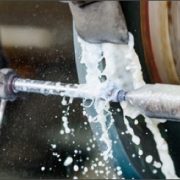Filtration Techniques For Metalworking Fluids
Filtration of metalworking fluids is a process to remove contaminants from lubricants, coolants or fluid mixes so they can be reused in a circulating system. Contaminants reduce performance and shorten the life of metalworking fluids.
Contaminants commonly found in the fluid reservoir are:
- Metal chips, grinding grit or both (swarf)
- Hydraulic and lubricating oils (extraneous oil or tramp oil)
- Debris such as shop rags, scraps of food, paper, etc.
Filtration implies the use of filter media such as porous cloth or paper, and metal screens to remove solid matter from the fluid — this is the case in positive filtration. However, the metalworking industry also applies the term “filter” to equipment which settles solids or separates them from a fluid mix (cyclones, centrifuges).
Types of Filters
Positive filters and separators are the two basic types of filtration equipment. There are several variations of each type on the market today. This article will focus on positive filtration.
POSITIVE FILTERS: With positive filtration, fluids pass through a porous filter via gravity, pressure or vacuum, leaving solid particles (swarf) on the filter media. Several common filter types include cloth, paper, wire screens or drums.
Positive filters collect large swarf that forms a “filter cake” which in turn, filters small swarf and grit from
the metalworking fluid. The thicker the cake becomes, the finer the filtration — efficiency increases as the cake builds up.
Eventually, the density of the cake reaches a point where the resistance to flow exceeds the vacuum or pressure
that is required to maintain it. At a predetermined point, the pressure or vacuum is topped, or a level is
reached, where the filter media index, exposing fresh media, and the cycle starts again. Filter units can also be
set to cycle on a time basis.
Positive filter designs:
- Gravity Filters
- Pressure Filters
- Vacuum Filters
- Tube Filters
Prolonging the life of metalworking fluids and optimizing performance are very dependent on the
control of the metalworking fluid system. This control includes maintenance of the mechanical components as
well as the metalworking fluid. This is as important as selecting the proper fluid.

